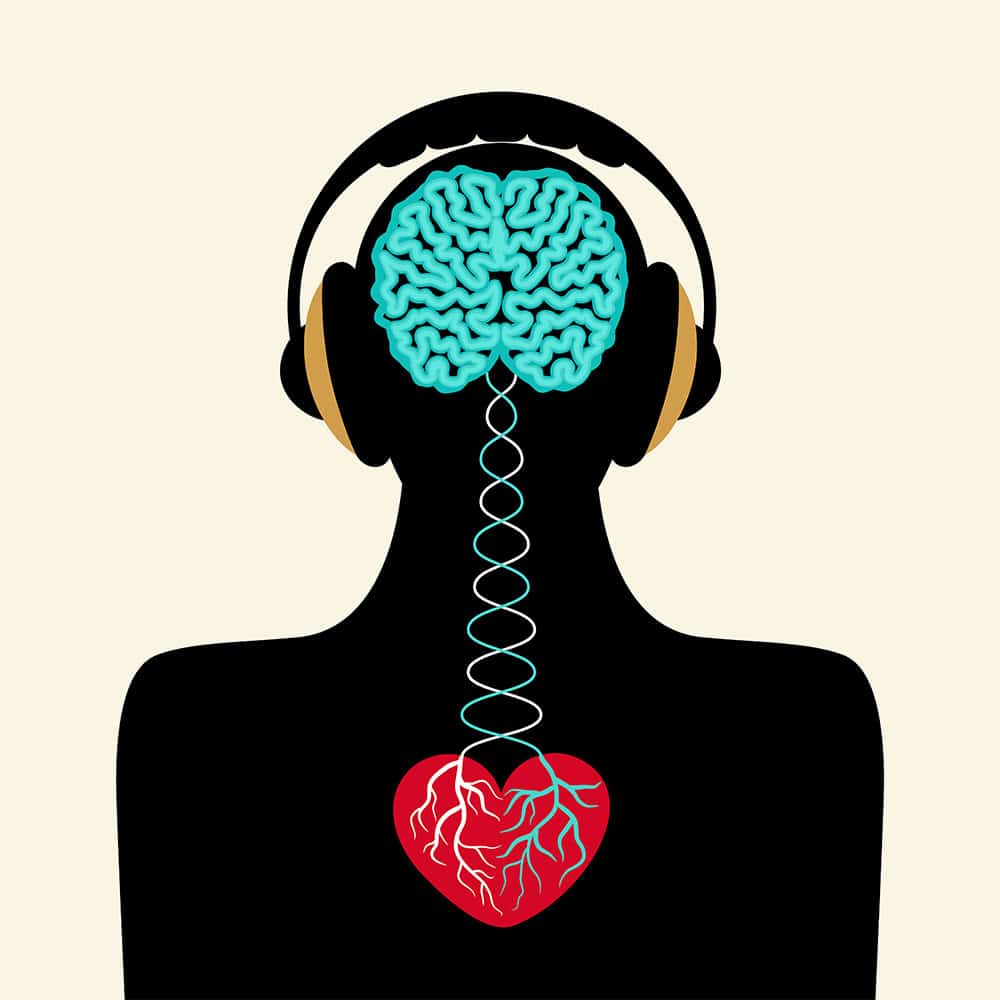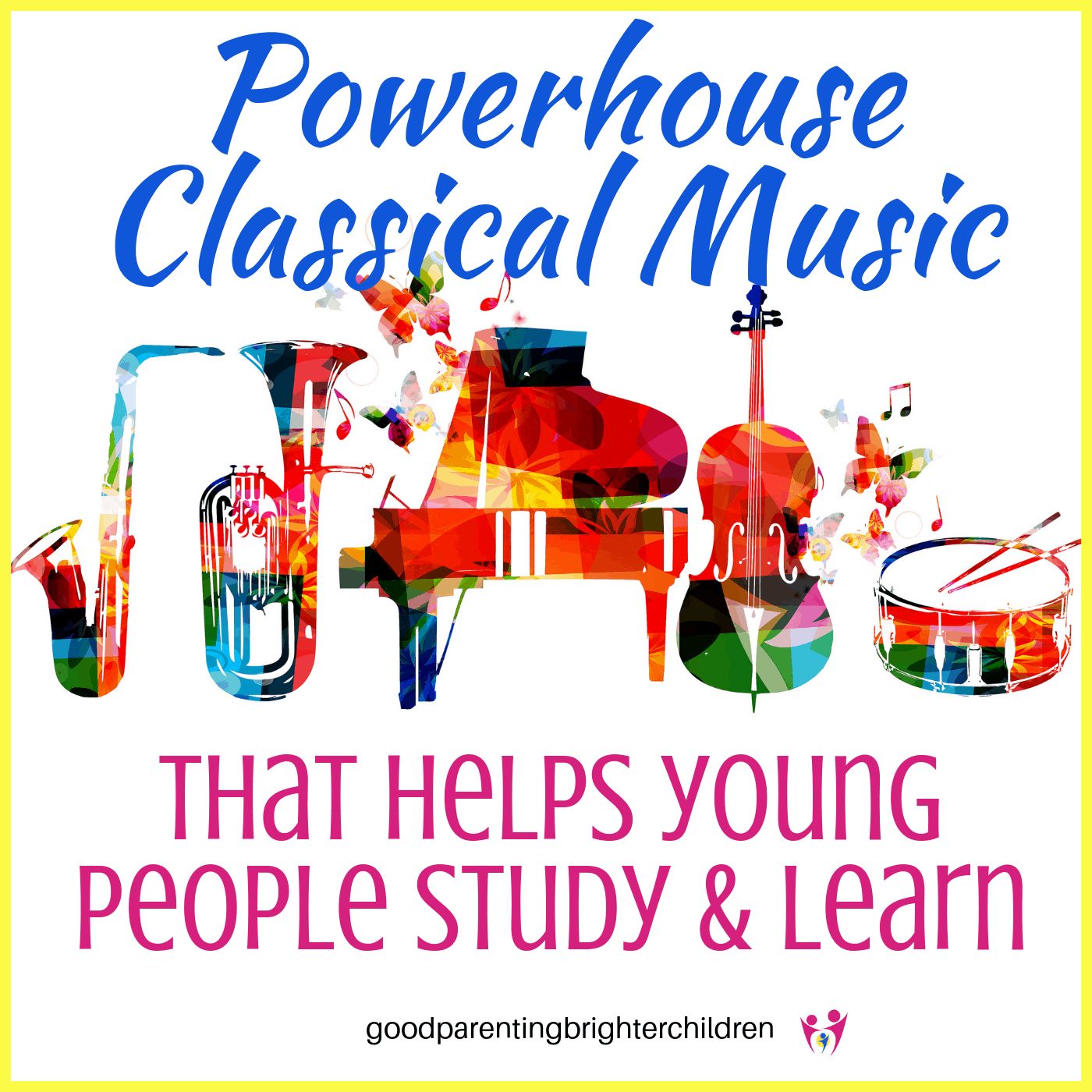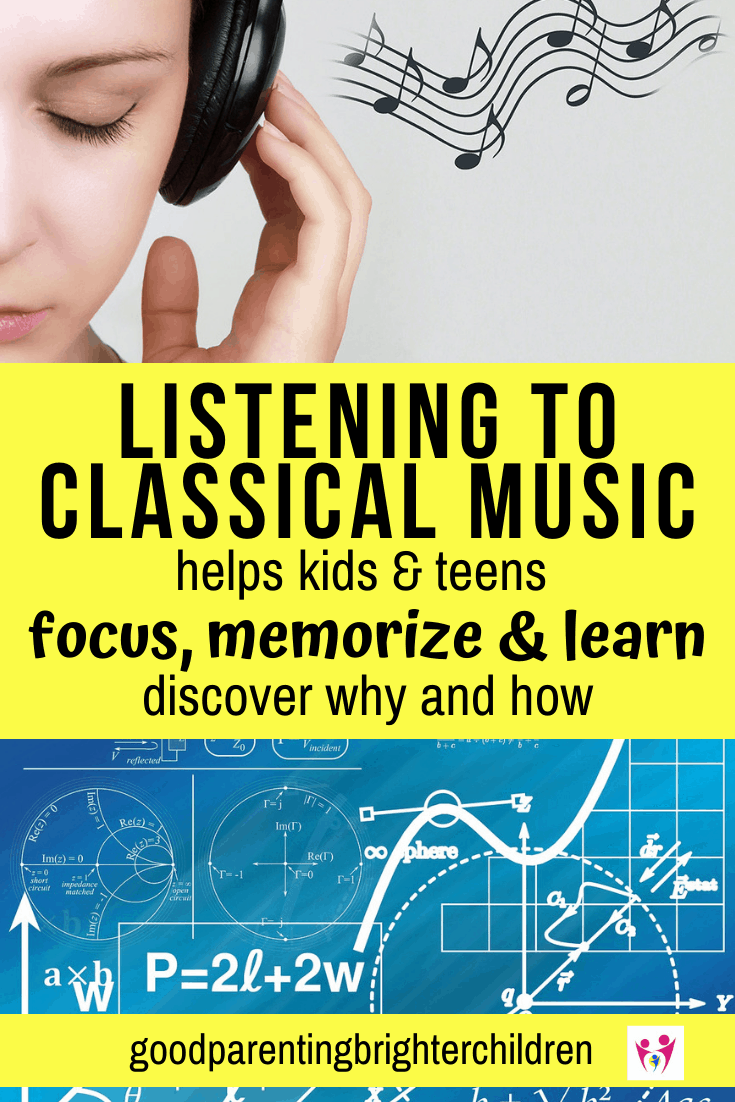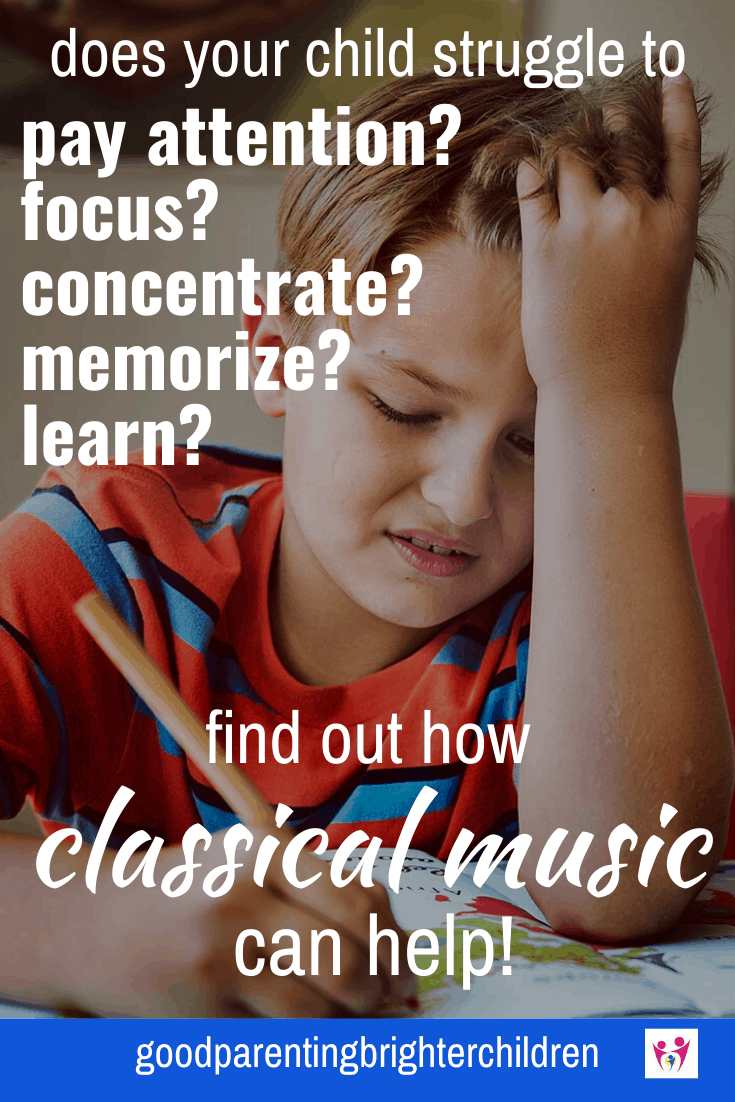Here are suggestions and ideas on how to use classical music to study to for your children and teens when they are doing homework or other activities requiring attention. This music will help them focus, concentrate and memorize information quicker and easier.
Classical Music to Study To
Did you know that 25% of children in schools have a learning disability?
Children spend at least 6+ hours each day in school and they need to feel a measure of academic success. And when children struggle to learn, it can affect their emotions, friendships with their peers, or feelings of self-worth.

Figuring out geometry is easy for some kids, but hard for others. That’s how learning is for many kids–difficult and overwhelming because they can’t focus, concentrate or pay attention. Music can help by changing the way the brain processes information for easier and more effective learning
The looming question is—what can help? Unfortunately, there are no easy answers. Different solutions have been tried—some have worked while others have not.
However, guess what scientists and educational researchers have discovered and agree upon in regard to what helps kids learn?
MUSIC
Music IS the catalyst for learning. Whether or not your child has a learning disability, an attention issue, an emotional challenge, or has no definitive learning issues –music will help make learning easier.
Music in all its forms—listening to, singing, dancing to, learning a musical instrument, etc., helps children to learn and best of all, the learning sticks!
Why?
Because when a child learns a musical instrument the entire brain is exercised simultaneously—visual, auditory and motor areas. And listening to certain pieces of classical music changes the way the brain processes information making it easier for a child to focus, concentrate, pay attention and memorize facts and figures.
Paying Attention is Necessary for Learning
There are four different ways that kids pay attention–and each is necessary for learning:
- Selective Attention: the child focuses on one thing at a time. They are able to block out other things or activities going on in the room and focus on the one task. (ADHD kids have problems with this)
- Divided Attention: the child is able to attend to more than one task. They can clean their bedroom while talking to a friend on the phone.
- Sustained Attention: the child can focus on one task for a long period of time; such as working on homework until it is completed or practicing a musical instrument for an extended time.
- Executive Attention: the child focuses on a larger task that may require setting a goal and doing the steps to achieve the goal and sticking to the task/goal until it is done. This type of attention is exercised over a period of days. SOURCE

Sometimes it’s very difficult for children or teens to pay attention. It seems as though their heads are “in the clouds” which makes paying attention very difficult. Music can help.
Many children have difficulties with one or more of these areas of attention. Again, MUSIC can help. Listening to certain pieces of classical music will help your child:
- concentrate
- focus
- memorize information and more
How This Works:
As stated earlier, when a child or teen listens to classical music, it changes the electromagnetic frequencies of the brain to approximately 7.5 cycles per second and triggers different brain waves that stimulate areas of the brain needed for focusing. This makes it possible for children or teens to pay attention when doing tasks.
Paying attention is the first step. The next step is being able to learn the information and commit it to memory. Here’s how memory and attention work together to help your child learn.
How Memory and Attention Work Together
As children learn, it’s essential that they move information from a sensory register to working memory. Meaning they need to
- hear it
- process it
- understand it
- store it (in memory)
- retrieve it (out of memory)
Attention plays a key role. Whatever children pay attention to mentally moves into working memory. (Ormrod) Working memory means they will be able to retrieve the information from their memory banks when they need it like when they are taking a test, or presenting a paper, etc.
It’s critical that students pay attention to the information the teacher wants them to learn. Attention is not just a behavior, it’s also a mental process. It’s not enough that the child’s eyes and ears are directed toward the classroom material. Their minds must be directed towards it as well.
And classical music has been found to help this process. Listening to certain pieces of classical music helps the body to relax, but the mind remains alert and is able to pay attention and memorize information needed for learning. As a result, the child’s listening, memory, and attention skills improve.

Listening to certain pieces of classical music helps kids of all ages to pay attention and learn information.
Better Grades and Test Scores
The natural outcome is better grades and test scores. Yes, listening to classical music can, in fact, improve test scores because the child pays attention, learns and memorizes the information; stores it in his/her mind and retrieves it when needed. In essence, they are able to learn easier and more effectively. And research supports this. For example:
- In Passaic, New Jersey Public Schools Summer Program for grades 2-6, music was used to teach children English and reading. The program included vocal and instrumental instruction and listening to music. All students achieved (Kohanski)
- The American Psychological Association (APA) found in 20 different studies that elementary school children listen, focus and learn better when listening to certain pieces of classical music. (Moon)
- First-grade students increased performance on standardized achievement tests while listening to relaxing music (Moon)
Classical Music to Study to for College Students: Increases Memorization
Listening to classical music will also help your college-age children. A study at North Texas University found that when certain pieces of classical music were played for college students, their memorization and retention skills improved significantly.
College students memorized 25 difficult vocabulary words while listening to certain pieces of classical music. The researchers found that the students who learned the words while listening to music did remarkably better on the tests than those who learned the words in silence. Two weeks later, the students were tested for retention. Again, those who listened to classical music were able to easily retrieve the information.
How this works:
Because music utilizes both sides of the brain, learning increases. Music causes the rhythms of the body—the heartbeat, brainwaves, etc.—to slow down and synchronize to the music. When the heartbeat slows, the mind works more effectively and the person can learn more easily. Psychologists for years have said if children can relax, they will be able to learn and memorize information easier.

Learning involves both heartbeat and brainwaves to be in sync. Certain pieces of classical music will cause this to happen and the result is more efficient and effective learning for the child/student.
Bottom line: your children, teens, and college-age kids will learn and memorize information easier when listening to certain pieces of classical music while studying, doing homework or other tasks requiring concentration. When used in the classroom, they will be able to pay attention and remember what the teacher is saying.
Suggestion:
What classical music helps you study?
Start with George Frideric Handel’s “Water Music.” Play it quietly in the background while your children are studying for a test, doing homework or writing a paper, etc. It takes about 20 minutes for the electromagnetic frequencies of the brain to change. Once that happens, learning and attention will increase.
Complete Music Course and Guide
I’m offering a course, “Powerhouse Classical Music that Helps Young People Study & Learn.” It’s a comprehensive course to help you understand exactly how to use specific music to help your children and teens. For this music to work for your kids, it requires more than just downloading some classical music and playing it for your children. Correct tempo and sound are crucial.
Here is what the course will include:
- 78 classical music tracks—all are specifically chosen for their sound and tempo and all have been studied and researched for their ability to change the way your child processes information.
- 2-hour video training
- 5 modules
- 8 lessons (that include step-by-step instructions)
- A downloadable PDF file of all the information from the lessons
- A copy of my 465-page eBook, Good Music Brighter Children
- Access to a private Facebook group (Good Music Brighter Children) to ask questions; pose concerns and get additional, personalized help.
- OPTION: 30-minute training with me for one-on-one help
If you are interested, please click here to access the sales page
The information in this course will put your child on a path to achieve academic success.
A Guarantee for Learning
As parents, we all want our children to love learning and find enjoyment in the process. In other blogs, I’ve talked about my severely learning-disabled son and how music was the catalyst for him learning and achieving academic success. Read more about Brandon here. You will be inspired by his story and see just how powerfully music made the difference in his ability to learn.
Guarantees are risky. However, based on 40 years of experience using music with my own sons, friends, college students, etc., I can confidently say that classical music to study to can and will help your child with all aspects of learning.
There are several studies I cite in this blog that you can access in my book, Good Music Brighter Children.
To access the video that goes with this blog, click below:
Have any of you had experience with playing classical music for your children while they studied? What were the results? Please share in the comment section below.
Want to remember this post? Post, “Why Classical Music to Study to is the Best Music for Learning” to your favorite Pinterest board!





My son and I are testing out this course that’s going live in February and I can’t rave enough about it! It’s simply amazing how something as simple as listening to a certain type of music while studying and doing homework can increase intelligence and understanding. I highly recommend purchasing this course for your child when it is released next month.